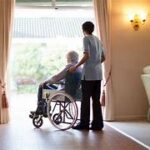Patterns of understaffing, medical harm and abuse in nursing homes are traceable:
- in some cases to a business model of understaffing to increase profits. Federal fines are built into the business models of the bad actors. Some of the worst post double-digit annual operating margins;
- in some to other systemic chain-wide issues, perhaps financial instability; and
- in yet others to local management incompetence and other site-specific issues.
Regardless of the reason, Virginia regulators and law enforcement agencies must execute the roles they are legally charged to perform.
State sanctions must be levied.
- The Health Commissioner can block the admission of new patients until staff levels support them or shut down those facilities that do not meet standards over a long period of time;
- The Department of Medical Assistance Services (DMAS) can suspend or halt Medicaid payments;
- The Attorney General can prosecute for civil or criminal violations.
Enforcement will result in fewer, but better and safer options.
An example. What is a nursing home? Is the Virginia Beach facility about which I wrote the other day a nursing home?
In the last quarter that facility provided registered nurse (RN) staffing at one third of the amount of minutes per patient per day during the week that CMS calculated as the norm for its patient load and patient care requirements.
On weekends, RNs were on scene at one twelfth of the calculated requirement.
Virginia’s OLC, correctly concerned and attentive, visited that facility within the past two weeks. The reports of the inspection are not yet posted.
Questions arise. What will the Health Commissioner do about that facility? Has DMAS continued to pay its invoices?
The state licenses nursing homes. The state can revoke or place restrictions on them.
OLC has responded to a request for comment:
Whether or not to restrict admissions or revoke/suspend a license is a decision the Commissioner is authorized to make.
This type of decision is not taken lightly and would be based on a number of factors including state inspection results, federal survey results or both.
The decision could be in conflict with CMS and could have ramifications with respect to the Certificate of Public Need (COPN) program
The OLC statement is helpful.
1. The reference to COPN is that opening a new nursing home or a major expansion is subject to a Certificate of Public Need (COPN). Of course. This is Virginia.
Based on widespread and sometimes severe understaffing, the COPN division needs to recalculate its assessments of nursing homes. A nursing home like the one in the example cannot be a pin in the map considered to be filling a public need.
For COPN disputes with OLC, we note that the Health Commissioner oversees both divisions.
2. In any conflict with CMS, it is Virginia’s license under which nursing homes operate. Conflict resolved.
Where we are. We cannot let shortages of nurses be an excuse for inadequate medical care leading inexorably to patient harm. Indeed, from CMS’ own studies, that is exactly where it leads.
Nurse understaffing has two sets of victims — the patients get hurt and sicker and the nurses burn out trying to help them. That in turn makes nurse shortages a self-fulfilling prophesy — staff nurses leave and qualified replacements refuse to work in such an environment.
The nursing home industry itself is threatened if no action is taken to limit those that have demonstrated that they cannot or do not deliver good medical care.
Innovation. VDH should consider, in cooperation with the Virginia Health Care Association, setting up a network of labs at state nursing homes to test robots and advance the science of nurse decision support systems to speed their implementation in Virginia.
CMS should not only permit, but encourage, such innovations by supporting testing with grants and creating modified staffing requirements and payment schedules as test results support the changes.
That can help in the medium term.
UVa School of Nursing’s simulation program can usefully assist in that effort.
The National Academies of Sciences, Engineering and Medicine publication, “The Future of Nursing 2020-2030” recommended technology infusion as I have. I attach the appropriate section.
Prosecution. Virginia has laws prohibiting Medicaid fraud, consumer fraud and elder abuse. Federal laws prohibit Medicare fraud and elder abuse and elder financial exploitation.
Cases can be pursued by Virginia’s Attorney General with criminal charges or civil charges. Conspiracy increases penalties under both federal and Virginia criminal law.
Regulation. The Virginia Department of Health, the state regulator, and the Department of Medical Assistance Services (DMAS), Virginia’s Medicaid Agency, have sufficient authority to act under current laws and regulations.
- The Commissioner’s disciplinary authority under current law is limited to revoking or suspending a license and restricting admissions. While OLC informs that less draconian intermediate sanctions could be a useful tool to have, that is sufficient authority to deal with severe understaffing, poor medical care and abuse.
- DMAS can withhold or deny payments.
- The Attorney General will have to act as well if criminal violations are found or if state-wide civil suits are necessary.
When they do act, Virginians will have fewer options for facility-based nursing care. But the ones that remain will be on average considerably better.
Under the laws of supply and demand, some nurses no longer working at facilities that close will be available as new hires for the more proficient ones that remain. A win-win if it happens.
Regardless, the process of weeding out the bad actors and those otherwise unsuccessful at providing needed medical care must begin. The official in state government with the authority to act most swiftly and surely is the Health Commissioner.
The ball is in her court.


Leave a Reply
You must be logged in to post a comment.